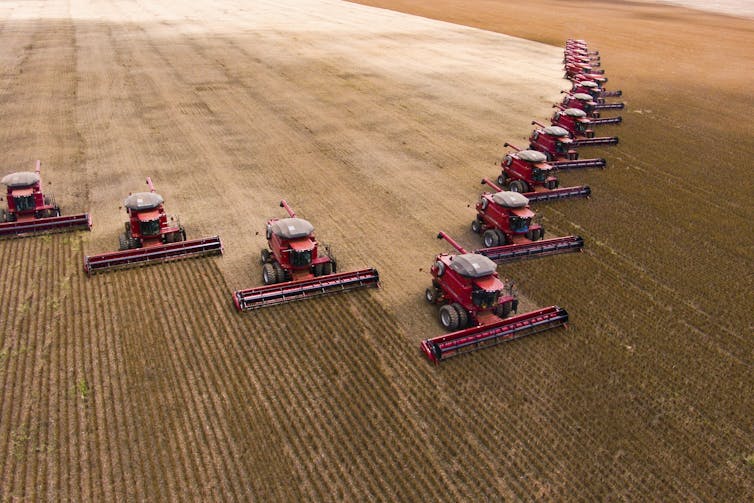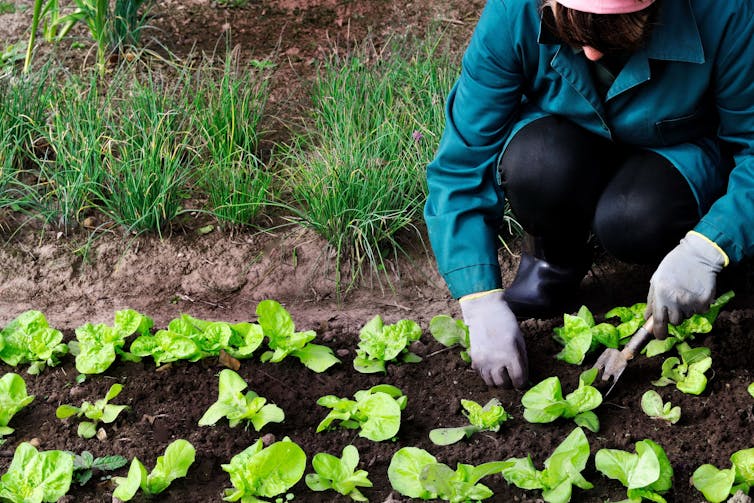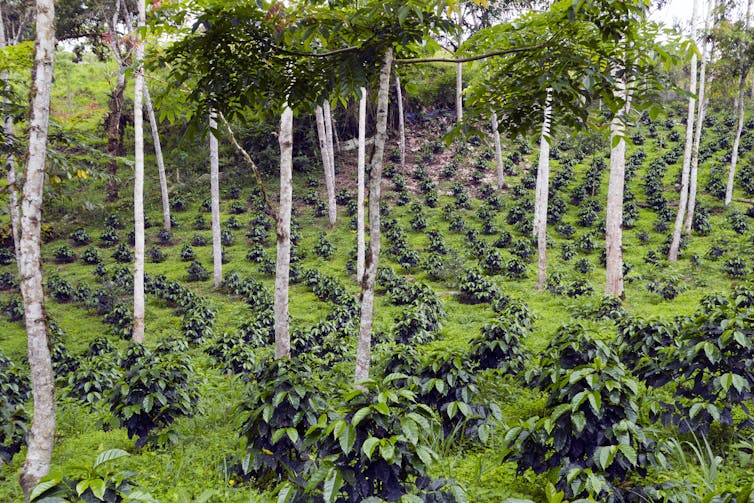Multiple reports have convincingly demonstrated that agroecology is the most promising pathway to sustainable food systems on all continents. But governments aren’t doing enough to support it.
NINA MOELLER, UNIVERSITY OF MANCHESTER
ISRF Independent Scholar Fellow 2016-2017
MICHEL PIMBERT, COVENTRY UNIVERSITY
Professor and Director, Centre for Agroecology, Water and Resilience

As the world races toward a projected 9 billion inhabitants, the failings of dominant food systems are impossible to deny. Current food production methods are severely polluting. They are the cause of malnutrition. They are also inequitable, and unjustifiably wasteful. And they are concentrated in the hands of few corporations. Entangled in the multiple crises humanity is facing, establishing global food security is considered a key challenge of our time.
Against the backdrop of climate change, resource shortages and urbanisation, the question of how to ensure adequate food supply for everyone looms rather large. The usual response emphasises intensifying the output of agriculture through the common model of petrochemical, large-scale, one-crop, intensive farming.
But business as usual is no longer an option for food and agriculture. The global agriculture system will have to be radically transformed to avoid further environmental and social problems, as was concluded by a three-year study commissioned by the UN and the World Bank involving more than 400 scientists. This report, as well as subsequent international studies by the UN Conference on Trade and Development and the UN Special Rapporteur on the Right to Food, have convincingly demonstrated that agroecology – farming that imitates natural ecosystems – is the most promising pathway to sustainable food systems on all continents.

Agroecology
Agroecology is based on the idea that farms should mimic the structure and functioning of natural ecosystems. In ecosystems, there is no “waste”: nutrients are recycled indefinitely. Agroecology aims to close nutrient loops – returning all nutrients that come out of the soil, back to the soil. In the case of vegetable farming, for example, this could be achieved through composting of vegetable scraps, human and farmyard manure.
Agroecology also harnesses natural processes to control pests and build soil fertility. Agroecological practices include integrating trees with livestock and crops (agro-sylvo-pastoral farming), producing food from forests (agroforestry), growing several crops together in one plot (polyculture) and using locally adapted and genetically diverse crops and livestock.
Throughout the world, small-scale farmers are uniting under the banner of agroecology. They do so not only to produce healthy and nutritious food, enhance biodiversity and adapt to climate change, but also to improve their income and working conditions by developing short food chains and local markets. Local ecologies and economies are being regenerated from below through an insistence on food sovereignty (community control over the way food is produced, traded and consumed) and transformative agroecology (as opposed to more watered down versions of agroecology, such as “climate-smart” or “conservation” agriculture).

But changes also need to be made on a larger scale. Some bodies recognise this. Faced with the growing social and environmental costs of industrial farming, the European Union adopted a New European Consensus for Development in June 2017. This commits the EU to:
Support agro-ecological practices and actions to reduce post-harvest losses and food waste, as well as to protect soils, conserve water resources, halt, prevent and reverse deforestation, and maintain biodiversity and healthy ecosystems.
But opening up agroecological pathways to sustainable food systems in the EU is a major challenge. Radical changes in funding priorities and research agendas are necessary. Similarly, a total overhaul of overseas aid programmes is urgently needed to support crucial transitions to agroecology in Africa, Asia and Latin America.

Absent aid
However, this is not currently happening. Our recently published research shows that very little overseas aid is directed at agroecological research and development. Since January 1 2010, no funds at all have been directed at or been committed to projects with the main focus on development or promotion of agroecological practices.
It is true that minor funds have been directed at projects which promote resource efficiency in farming. But this is a very basic agroecological principle. Based on the most generous interpretation of available figures, our study shows for the first time that aid for agroecological projects is less than 5% of aid given for agricultural purposes and less than 0.5% of the total UK aid budget. By largely supporting industrial agriculture, UK aid priorities contribute very little to the transition towards global socio-ecological sustainability.
Despite the obscure nature of available information, it is reasonable to assume that there is a similar lack of funding for agroecology in the overseas aid priorities of other so-called developed countries. There is, after all, a chronic lack of internal investment in agroecology within these nations.
Business as usual may rhetorically no longer be an option in food and agriculture. But it will be, as usual, practically the only option as long as these stark funding asymmetries remain.
In April 2018, government representatives from around the world will travel to Rome to discuss how to scale up agroecology. This UN Food and Agriculture Organisation International Symposium on Agroecology is a unique opportunity to rethink priorities for agricultural development worldwide. Among the many actions needed, we urgently need to see a substantial increase in public funding for agroecology – both within and between nations.![]()
Dr Nina Moeller
Marie Curie Research Fellow, University of Manchester
My academic background is in philosophy, sociology and anthropology.
Since 2005 I have been working in the Amazon, with Kichwa communities and federations in the Upper Napo, Ecuador. I also maintain relations with Shipibo community leaders in the Ucayali, Peru and have worked in Latin America and Europe as a consultant to indigenous federations, NGOs, and the United Nations’ Food and Agriculture Organization. I wrote my PhD on ‘The Protection of Traditional Knowledge in the Ecuadorian Amazon: A Critical Ethnography of Capital Expansion ‘ (2010).
Professor Michel Pimbert
Director, Centre for Agroecology, Water and Resilience, Coventry University
Professor Michel Pimbert is the Director of the Centre for Agroecology, Water and Resilience at Coventry University. An agricultural ecologist by training, he previously worked at the UK-based International Institute for Environment and Development (IIED), the International Crops Research Institute for the Semi Arid Tropics (ICRISAT) in India, the University François Rabelais de Tours in France, and the World Wide Fund for Nature in Switzerland. He has also done research for the UN Food and Agriculture Organisation (FAO), the United Nations Research Institute for Social Development (UNRISD), The World Conservation Union (IUCN), and the United Nations Educational, Scientific and Cultural Organisation (UNESCO).